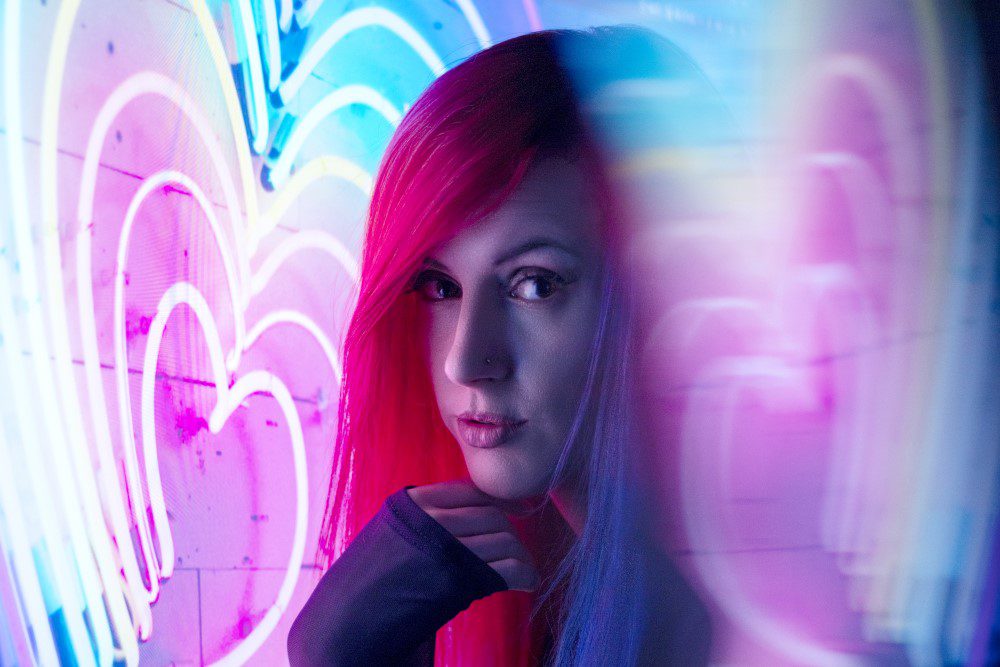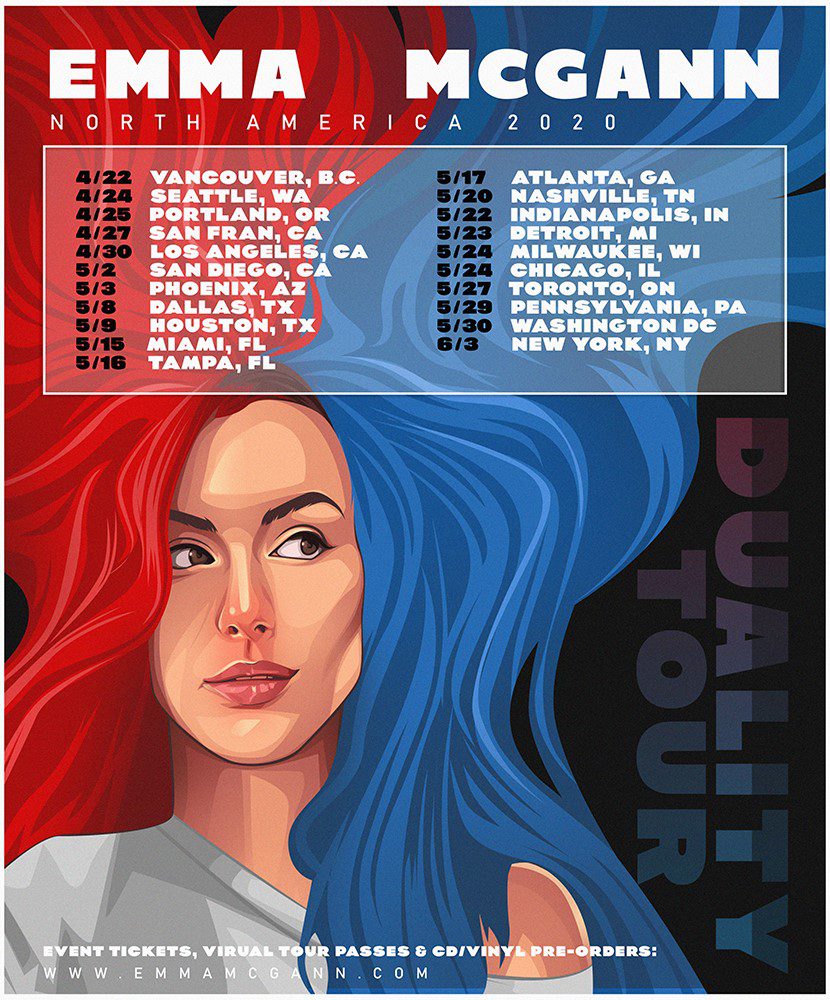Emma McGann Premieres “Anyone Else,” Announces Virtual Tour


British pop singer Emma McGann has always been a pioneer in promoting her music online, and she’s now using this skill to her advantage. She created a hybrid tour format that includes both virtual and in-person elements last year, and now, with many artists’ tours shutting down due to the coronavirus, she’s putting the virtual element to use.
Inspired by artists like The Runaways, The Donnas, Katy Perry, and Alanis Morissette, McGann’s music is uplifting and adrenaline-pumping, presenting classic pop conventions with a twist. She spent her early career living in a van and touring around England, then quickly discovered she could get more attention by live-streaming her performances. The in-person elements of her upcoming “Duality Tour” have to be rescheduled due to the pandemic, but online, the show goes on.
The tour will support her forthcoming EP, Monsters (April 17). Ahead of its release, McGann is premiering her catchy, danceable new single “Anyone Else” exclusively on Audiofemme. On it, McGann describes an all-consuming love: “I don’t know, I don’t know / How to love anyone else / Anyone else but you / Holding up a flare and it burns for us / I’ll always find my way back to what I love / Fingers in the air to the other ones / They’ll never know how to love you enough.”
We talked to her about her new music and how she’s taking advantage of technology during these strange times.
AF: What inspired the song “Anyone Else”?
EM: “Anyone Else” is about carving out a future with someone while the roots of the past creep to the surface. It’s inspired by my own relationship. My boyfriend and I have been together for 10 years. We’re partners in this sense, but also in the studio, too. James, or MIRLYN (his producer name), is a wildly talented and underrated producer, and it was a very raw experience bringing this one to life together. The tone is darker compared to what I usually write, so it felt like new and exciting territory for me during the writing process. We’re both so proud of it. It’s the first chapter of my Monsters EP.
AF: What else is Monsters about?
EM: For Monsters, I wanted to throw out the fluffy pop sound I usually go for, bring some gritty realness, and expose love for what it is: in every case, imperfect. “People can be monsters when in love.” That’s a line taken from another track on the EP. We’re the Monsters. It’s a term of endearment for ourselves and the people we love, because we’re all imperfect.
Many want to live up to the lives they see online – they question their own relationships and compare what they have to what others have. But IRL, relationships aren’t polished Instagram moments. They go much deeper, they’re multi-faceted… uglier. And that isn’t a bad thing. It’s a very real, beautiful thing. A lot of what I’ve written for the new EP sets out to unearth these darker sides of love from a positive perspective. Monsters will celebrate recognizing the beauty in the imperfections we all have in ourselves and in our own relationships.
AF: Tell me about the hybrid in-person/virtual tour you’ve created.
EM: Last year, I set out to create a touring business format that could work for the online creator — a model that would make touring financially viable for someone whose core audience lives online, or for someone touring for the very first time. I wanted to create a hybrid in-person/virtual live-streamed run of dates called the Duality Tour that would be inclusive for supporters on the other side of the world, who might never get the opportunity to experience a live show if you don’t ever tour their country.
So, I created the Virtual Tour Pass, which gives the holder exclusive access to the livestream shows, as well as other perks. It was important to me to make this option affordable and community-centric. One VT Pass ($25) not only gives supporters access to all livestream shows on the tour, but also brings other perks – every purchase plants a tree, their name is written on my guitar case, etc. They can also buy bulk passes for others in the community, which brings even more rewards.
As has been the case for many other artists out there, COVID-19 has meant I’ve had to postpone the in-person element of the tour. It would’ve been the biggest tour of my career to date — 21 dates across the US. But the virtual element remains, and I’m happy to say that the originally-scheduled virtual shows will still take place from April 22nd.
Traditional touring determines where your fans are at: You decide the locations you play, and by default, your fans and traction typically come from those places. With the evolution of music-streaming platforms, playlist placements almost determine that for you, leaving many artists out there with a good chunk of streams online, but sporadically placed fans dotted everywhere around the world. This means traditional touring success falls short. No one is localized. I see my idea for Virtual Tour Passes as something that could balance things out. I think it could benefit online creators looking to tour, as well as artists who have found streaming success but lack that localized following to tour in a financially viable way.

AF: How else have you used live-streaming in the past?
EM: Over the last six or seven years, live-streaming has enabled me to grow a connection with supporters that I could never have done by just traditionally touring alone. It’s like I’ve opened up a window to my life as an artist, showing them the real ins-and-outs of what it takes to create, release, and perform independently. Over the years, I’ve streamed behind-the-scenes during music video shoots, broadcasted takes from the vocal booth, streamed for eight hours on a single release day in 2015 with my community helping me reach the Top 15 in the iTunes Charts in real-time… and at one point, my supporters even helped me raise $30,000 during my livestreams for a Kickstarter campaign to release a 23-track album. The level of support for my music through the medium of live-streaming has always been unreal. More often than not, though, we keep it casual — I share my music and we just… hang out. It’s that simple.
AF: How do you see live-streaming changing music?
EM: In recent years, we’ve seen live-streaming become integrated into social platforms we all use daily. More and more artists over these last few years have begun to integrate the live-streaming format into how they connect with their audience. As someone who started experimenting with live-streaming at the beginning of its inception, it’s really exciting to see it being used so widely today.
In the beginning, I had a job explaining to most people what it was and how it was benefiting me as an artist. I think a lot of people didn’t understand the concept… that is, until they tuned in or I went live and showed them how instantly I could connect with viewers who would jump straight into the broadcast.
I live-streamed for YouNow (my primary livestream platform) during a panel they were on around four years ago at SXSW. The panelist asked the audience at the conference if anyone had a birthday, and the room erupted with joy when I was prompted in the chat to sing Happy Birthday to that person, live in real-time. It was a unique moment for a lot of people then who hadn’t experienced live-streaming before. I think the audience during my TEDx Talk felt that same experience. It’s weird that it’s now the norm and it’s a format that everyone knows, understands, and has experienced.
I think it has already changed the industry. More and more artists are letting down their walls and allowing their audiences to hang out with them. People finally understand that musical content plus personality-driven content is a recipe for success.
AF: What role does social media play in your work?
EM: Connection to audience is the most valuable thing any individual, artist, or business can have. The internet plays a crucial role in what I do day-to-day as an artist. Whether it’s a YouTube upload, a Q&A on Instagram, or a livestream, it’s at the core of how I work and reach new and existing supporters.
As the broadcaster, interacting in real time does put you in a vulnerable position. If you make a mistake, that’s it. It’s live. There’s no smoke and mirrors. People see you for who you are. I think that’s what a lot of audiences crave to see from their fave artists. I think for a long time, people have been afraid to break down that mystique that artists are expected to uphold. But I truly think audiences look up to you not just as a means to hear the music you have, but to see a part of themselves in you too. We’re all human. Viewers appreciate you sharing your music in that vulnerable way. The internet can be malicious and toxic at the best of times, but it has undoubtedly connected us in very positive ways, too.
AF: Which other artists have inspired you?
EM: I’m hugely inspired by women who are using their voices and platform beyond their own music and profile to stand up for what’s right. Lady Gaga, P!NK, Taylor Swift… all fine examples. But I’m largely inspired by those who are doing things completely differently, too. Amanda Palmer and Imogen Heap come to mind. Imogen is a pioneering artist in music tech… Amanda’s TED Talk blew my mind when I first saw it as a student. These women and many more continue to inspire me. There’s a quote by Stevie Nicks that I adore and have pinned up in my broadcast studio. It reads: “Don’t be a lady, be a legend.”
AF: What are you working on now?
EM: I’ve been fundraising in an effort to help nurses and doctors on the front lines, particularly for healthcare professionals working in ICUs during the COVID-19 outbreak. I wrote and recorded a raw, acoustic 10-track album in the first 10 days of lockdown and have made that available on Bandcamp, with 100 percent of the proceeds going to the Intensive Care Society in the UK. That mini-album is called Jungle Tapes.
I’m also working on my first podcast series, which will be a weekly discussion highlighting inspirational women across different industries, diving into their stories of success and outlooks on life.
Follow Emma McGann on Facebook and Instagram for ongoing updates.

